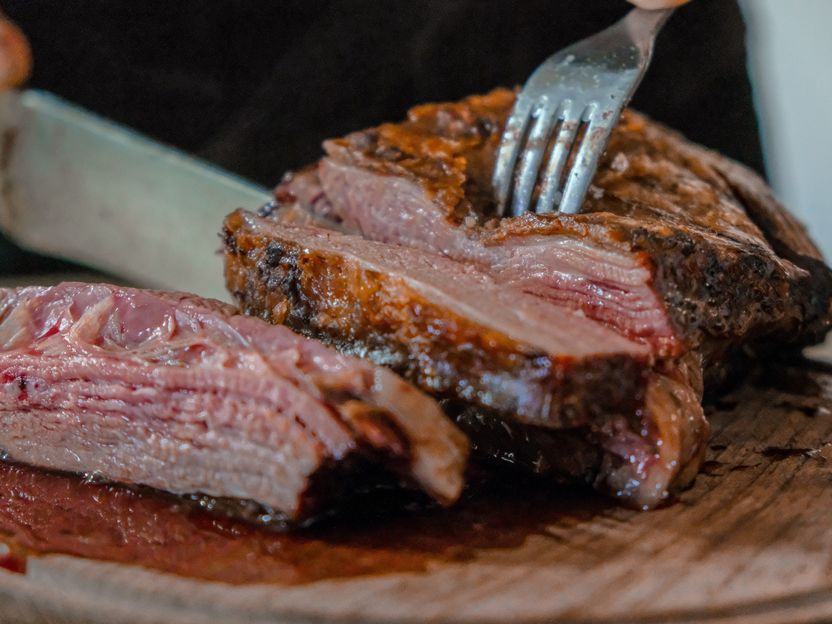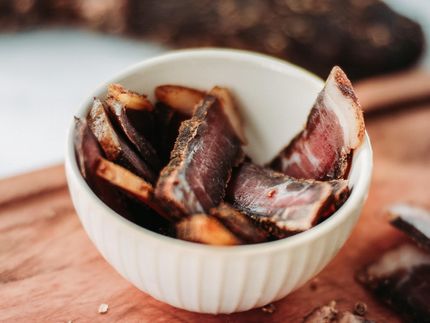Environmental benefits associated with cutting back on meat decline as money-saving association soar
When it comes to cutting back on meat, sustainability is taking a backseat as the cost of living crisis continues to bite. According to new research from Mintel, the perceived financial benefits of eating less meat skyrocketed during 2022.

José Ignacio Pompé / Unsplash
When asked about the benefits of cutting back on meat, Mintel research reveals the percentage of consumers who believe eating less meat is a “good way to save money” rose from 27% in 2021 to 43% in 2022. Meanwhile, the view that reducing meat consumption is “better for the environment” fell from 47% in 2021 to 41% in 2022—as meat reduction’s environmental benefits were felt less keenly in 2022.
Overall, one in ten (10%) Brits are non-meat eaters, including 14% of 16-24s and just 5% of over-65s. Nearly half (47%) of adults today either don’t eat meat/poultry or have limited/reduced the amount they eat. A further 14% have yet to reduce their meat consumption, but would be interested in doing so.
While less than 2% of Brits say they follow a vegan/plant-based diet, according to Mintel Global New Products Database (GNPD) the vegan trend continues full steam ahead in terms of new product development. Over a quarter (27%) of all UK packaged food and drink product launches made a vegan/no animal ingredients claim in 2022, compared to one in six (16%) in 2018**.
Alice Pilkington, Senior Food and Drink Analyst at Mintel, said:“Public awareness of the role that meat and dairy play in the climate crisis accelerated between 2018 and 2021, contributing to the popular perception that eating less meat is beneficial to the environment. This overtook weight management and saving money as the previously top perceived benefits of eating less meat.
“In 2022, however, the perception of environmental benefits of reduced meat eating took a knockback, reflecting how sustainability more broadly has been deprioritised for some amidst current pressures on household budgets.
“The cost of living crisis presents an opportunity for inherently vegan products, such as chickpeas and lentils, which can pad out meat-based meals or replace meat to make recipes more affordable.”
Meat substitutes market falters in 2022
While the rising cost of living is driving consumers to reconsider their meat consumption, the income squeeze is putting pressure on meat substitute sales. Following five years of impressive growth of meat substitutes (with sales doubling from £289 million in 2017 to £586 million in 2021) the market faltered in 2022 as sales fell just over 6% to £548 million in 2022.
Overall, half (49%) of Brits say they eat meat substitutes, with around one in four (26%) eating them weekly. And while usage is high, there has been a sharp fall in daily usage as the number of meat substitutes users eating them daily slipped from 12% in 2021 to 7% in 2022***. The relatively high price of these products is presenting a significant barrier to growth as half (52%) of red meat/poultry eaters say they would buy meat substitutes that are cheaper than meat.
“The absence of COVID-19 restrictions at the beginning of 2022 led to a loss of at-home meal occasions, which is being felt across much of food retail. In addition, as household incomes have come under increasing pressure as the year has progressed, the relatively high price of meat substitutes has resulted in consumers cutting back on these products. Whilst those reducing meat consumption due to financial considerations present an opportunity for meat substitute brands to grow their audience, cost will be a significant barrier for many who would otherwise be open to them.
“Vegetable forward products—which don’t claim to mimic meat, such as bean burgers—remain considerably under-explored given the level of interest. Two-thirds (65%) of meat substitute buyers say they would be more likely to try products that don’t mimic meat. These products are at an advantage given that their ingredients are familiar to many consumers and their long standing health halo—both of which could lower barriers to trial.” Alice concludes.
*Mintel defines meat substitutes as products often made from textured vegetable protein, such as soy, that imitate the texture, flavour and appearance of certain types of meat, such as beef, poultry or fish. This includes products such as mycoprotein-based Quorn. However, they can also be made with plant-based ingredients which do not try to imitate meat, such as vegetable or bean burgers or tofu.
**Jan-Dec 2022 and Jan-Dec 2018 respectively.
***1,052 UK internet users aged 16+ who have eaten meat substitutes in the last 6 months and 986 UK internet users aged 16+ who have eaten meat substitutes in the last 6 months.






























































